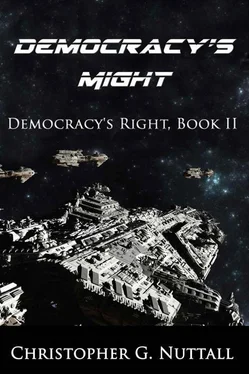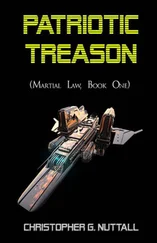It was nearly thirty minutes before they were helped to their feet and pushed towards the hatch. The Marines had searched the entire ship from end to end, then shut down the remaining fusion core, leaving batteries to power the ship. Shadow already felt dead, Jeremy realised, as they were prodded into the shuttlebay. The rest of her crew had already been loaded into shuttles and transported elsewhere. He drew in a breath as his senior officers were scanned, their DNA and fingerprints checked for identification purposes, then loaded into shuttles themselves. One way or another, they were helpless now. Their fate was in the hands of the Empire.
* * *
Penny watched with mixed feelings as the prisoners were unloaded in Station One. Wachter had insisted on moving the prisoners there as soon as their ships were secured, then grabbed Penny and taken her with him to the station. Penny hoped the rebels weren’t planning a second attack, if only because Wachter wouldn’t be on his command deck, but they had taken a battering. It was unlikely that they could regroup quickly enough to mount a second attack, yet they had to know that they risked losing the war…
“We have identified seventy of them as mutineers, Admiral,” Colonel Graves reported. The grim-faced Marine had seen Wachter enter the compartment and walked over to report at once. “The remaining two hundred and fifty-two are unknown to us.”
“So few survivors,” Wachter mused. “How many bodies did you find?”
“In total, four hundred and twelve,” Graves informed him. “We didn’t pull them out of the hulks, just left them to freeze.”
Wachter exchanged a glance with Penny. There should have been more bodies, which suggested that they had either been vaporised… or that the rebels were so desperately short of crew that they’d been forced to rely heavily on automation. Maybe that explained why Omega had been so successful, at least at first. They weren’t ready to take the risk of questioning their systems so closely.
“If there’s anyone hiding on the ships, they will die when the air runs out,” Wachter said, finally. He looked over at the prisoners. “Any surprises?”
“No, sir,” Graves said. “They were quite docile.”
“That is to be expected,” Smyth’s voice said, from behind them. “They were not only beaten, they were defeated .”
Wachter swung around to face the intelligence officer. “Your help during the battle was remarkably useful,” he said.
Smyth coloured. The subtle insult hadn’t missed its target. “Thank you, Admiral,” he said, tartly. “I’ve come to take the prisoners into custody.”
Wachter gave him a long considering look. “I’ve already promised to treat them under the Gulliver Protocols,” he said. “I’m afraid that Imperial Intelligence will not be handling them.”
“The Gulliver Protocols do not apply in this case,” Smyth informed him. “While the unidentified rebels can be reasonably considered prisoners of war, even though it is a declared legal principle that the Empire is the sole source of authority and all power derives from it, the mutineers cannot be considered anything other than traitors. As such, they are specifically excluded from consideration — or protection under the protocols.”
Penny swallowed an oath. Legally, Smyth was right — and the Empire, which considered itself the ruler of the known universe, had plenty of precedents to back up its view. Everyone knew that interstellar law was what the Empire said it was, even though the Thousand Families hadn’t hesitated to change the law when it looked to be barring them from obtaining whatever it was they wanted. What was the point, Percival had once said, of absolute power if someone could get around your laws?
“I gave them my word that they would be considered prisoners of war,” Wachter said, coldly. “They surrendered, Director, on those grounds, rather than continuing to fight. I do not intend to break my word.”
“But that was not your promise to make,” Smyth said. There was an undeniably smug tone in his voice as he spoke. “It was decided, by the Families Council, that any captured rebels were to be turned over to Imperial Intelligence, along with anyone else who might have been… contaminated .”
He shot Penny a sidelong glance, then continued. “I am willing to concede that the Beyonders are in no need of anything, beyond re-education, but the former mutineers are traitors against the Empire. My orders specifically state that they are to be returned to Earth for interrogation, followed by execution. There can be no mercy for those who rise up against the Empire.”
Wachter met his gaze. “They can be sent to a penal world, where they can no longer threaten the Empire,” he said. “There is no need to interrogate them.”
“But there is,” Smyth insisted. He plucked a datapad from his belt and held it out. “One of them is a high-ranking officer in the rebel fleet. Think about what he knows! What we can get from him… tell me, Admiral, is it really worth blighting your own career just to keep him safe for a month or two? Because the Families Council will decide to take the captives and interrogate them.”
He lowered his voice. “And, by then, whatever they know might well be out of date,” he added. “What is the point of resisting the inevitable?”
“I believe the rebels might ask the same question,” Wachter said, sharply. “ They believe that the collapse of the Empire is inevitable too.”
“More to the point,” he added, “we made them a promise. We told them that we would treat them honourably. If we break that promise, no one will ever surrender again.”
“You just gave them one hell of a beating,” Smyth said. “Does it actually matter how we treat prisoners now?”
“The rebels are not — yet — beaten,” Wachter snapped. “Until we have occupied every last rebel world, destroyed every last rebel ship and sent every last irredeemable rebel to the penal colonies the rebels are not beaten. And treating prisoners badly will only make it harder to come to any form of political agreement, let alone convince the rebels to surrender.”
Penny suspected that his words were falling on deaf ears. Smyth might understand, he might accept what they said, but his superiors would not. Imperial Intelligence had taken a major black eye when the original mutiny plots had gone undetected before they exploded into the light. They needed a victory, just as badly as the Imperial Navy had needed the Battle of Morrison. And they wouldn’t worry about whatever Wachter had told a bunch of traitorous mutineers. Why should they?
“We will employ gentle interrogation techniques on the former mutineers,” Smyth said, finally. “The Beyonders can be sent to a penal world.”
“See to it,” Wachter growled. “But remember what I said.”
He turned and looked at the final prisoners as they made their way out of the shuttles and into the corridor leading to the holding cells. Penny followed his gaze. The sight of the prisoners sent a shudder down her spine; in some ways, they looked like she’d looked, after Percival had taken his anger and frustration out on her. Their eyes were wide and fearful; a handful of them looked at her, then looked away, as if they were afraid of her. And they might well be, Penny knew. They were completely at the mercy of their captors.
Wachter snorted, then turned and led her back to the airlock. “That man will overreach himself sooner rather than later,” he snapped, as they stepped into the shuttle. “And I hope I will be there to see it.”
Penny hesitated, then took the plunge. “Do you trust him not to abuse the prisoners?”
Читать дальше












